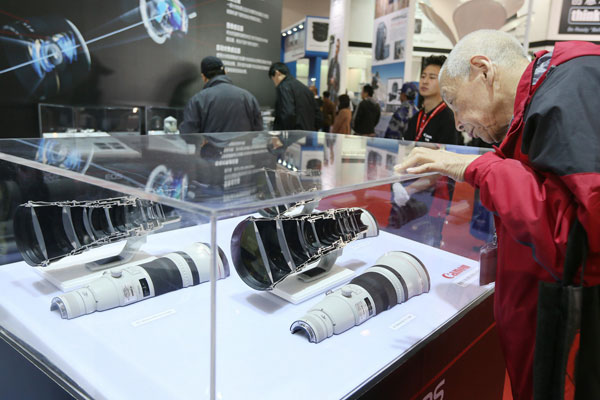
|
 |
|
A Beijing resident examining Canon telephoto lenses at the 16th China International Photograph and Electrical Imaging Machinery and Technology Fair in Beijing in April. Provided to China Daily |
Japanese firms view China as the big buyer of high-end cameras
China is the world's largest buyer of high-end cameras, with the expanding middle-class population likely to fuel demand, said an executive from Canon Inc, the Japanese camera maker.
"The increasing demand in high quality single-lens reflex cameras is increasing despite the slowing Chinese economy," said Howard Ozawa, managing director of Canon and president of Canon Asia Marketing Group.
"Because Chinese people are spending more money on traveling and sightseeing, we've been able to sell our full line of products in the country."
Canon hopes it can lift China sales to $10 billion by the end of 2017, boosted by strong demand for cameras and printing devices.
The Japanese company heavily relies on foreign markets. Four-fifths of its sales were generated outside Japan, said Reuters.
Weaker international demand for compact cameras plus global zeal for smartphones equipped with high-definition cameras is hurting Canon's sales.
Canon said its first quarter operating profit fell 34 percent year-on-year. The company's first quarter operating profit was 54.8 billion yen ($552 million) from 82.7 billion yen a year ago.
However, Ozawa was optimistic about Canon's business in China although the nation's gross domestic product started to show signs of decline. The GDP of China increased by 7.7 percent year-on-year in the first quarter compared with an advance of 7.8 percent for the whole of 2012.
With more and more Chinese people traveling around the globe on vacations, camera sales are set to surge, said Ozawa.
The average price for high-end cameras in China is about $100 higher than those in the United States, according to Ozawa.
"The price does not seem to weaken Chinese people's interest in such devices."
As millions of Chinese tourists spend billions of dollars each year on sightseeing, they will certainly be willing to pay for a high quality camera to capture memories en route, he added.
Boosted by increasing incomes, China's emerging middle class spent a record 3 billion euros ($3.8 billion) on duty-free shopping in 2012, according to Global Blue, a European tourism shopping service provider. The company said the sum did not include a large amount of transactions outside Europe.
Chinese shoppers are also the most generous group. The average transaction size hit 875 euros last year, the highest among all nationalities, said Global Blue. The second highest spenders were Thais, who on average spent 100 euros less than the Chinese.
Like other developed markets, Canon found Chinese customers' requirements are more difficult to satisfy because people like to add more personalized features to their cameras. Manufacturers such as Nikon Corp, Sony Corp and Olympus Corp have released devices featuring personalized functions.
"We are aiming to launch more personalized devices in China to fight off competition," said Ozawa.
In 2012, Canon's sales in China reached $3 billion because of its advance in camera and enterprise-level businesses.
Looking forward, Canon said increasing demand for interchangeable-lens digital cameras is expected to grow in all regions because of expanding user bases in developed countries such as Japan and the US as well as market growth in emerging countries such as China.
Since the establishment of its China branch in 1997, Canon now has production plants and research and development facilities in Liaoning, Guangdong and Zhejiang provinces.
The company has more than 35,000 staff in China, making it one of the biggest camera makers in the country.